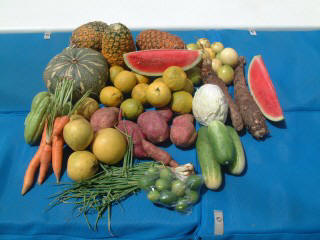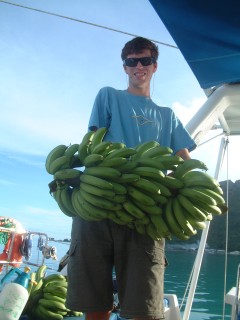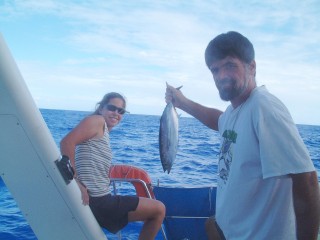

|
|
Cruising Priorities
 For
day-to-day supplies such as perishable food, provisioning the boat is similar
to on shore. Every few days while we are in port, my mom makes a list of fruits,
vegetables, meats, etc. and goes into town to shop. We have to use taxis or
busses if the
store is more than a mile or so away from a dock, but other than that the
shopping goes much the same. The biggest differences are in what we buy. For
example, we only get a few frozen goods and almost never buy liquid milk. We
also tend to buy certain things in some places, and not in others. For example,
while eggs are almost universally available, in some areas they are so expensive
we hardly buy any. In other places (French islands, for example) we nearly
always buy a baguette (French bread, cheap but it only stays good about 24
hours) every day or two for lunch.
For
day-to-day supplies such as perishable food, provisioning the boat is similar
to on shore. Every few days while we are in port, my mom makes a list of fruits,
vegetables, meats, etc. and goes into town to shop. We have to use taxis or
busses if the
store is more than a mile or so away from a dock, but other than that the
shopping goes much the same. The biggest differences are in what we buy. For
example, we only get a few frozen goods and almost never buy liquid milk. We
also tend to buy certain things in some places, and not in others. For example,
while eggs are almost universally available, in some areas they are so expensive
we hardly buy any. In other places (French islands, for example) we nearly
always buy a baguette (French bread, cheap but it only stays good about 24
hours) every day or two for lunch.
Some of our most sought-after provisions are fresh fruits and vegetables. For example, mangoes, papayas, lettuce, and celery aren't exactly rare treats, but they don't keep long so we like to get them when they are available. Meat is another thing we try to keep in stock, but our freezer is so small that we can only keep a few meals-worth on board.
We always look for supplies that do not need refrigeration (or not much) and don't weigh much. In some ways it is like backpacking, except we do have a fridge and small freezer, and can carry more weight and bulk. Nonetheless, we always have powdered milk, powdered or concentrated juices, and even powdered eggs. Similarly, we buy in bulk and vacuum seal staples for storage, and make most of our own food from scratch. For example, we get bulk oats whenever possible, and bake our own granola for breakfast.
We also consider money. Although we keep well stocked with a (usually) good assortment of food, items like soda are considered real treats. There are places where a soda (or beer or juice) can be more than $1 US per can. Similarly we have few snack foods such as chips. To offset this, we bake a lot (cookies, cakes, pizzas, scones, etc.), nearly always from scratch. Fortunately, staples like flour, sugar, butter, and so on are usually relatively cheap.
Of course, the main significant part of boat provisioning is providing food for weeks or even months away from stores. There is a wonderfully wide variety of easily stored foods today, including ready soups, cooked and canned chicken, freeze-dried fruits and vegetables. We stock up on these, fill up our fridge and freezer, and buy as much fresh produce as we can carry.
 Buying lots of food is really just a matter of money. Storing it, however,
becomes a lesson in space utilization. We maximize our fridge and freezer space
by stocking up on things like cheese and boneless meat, which fill space
efficiently and provide good protein. Well-sealed items, like bottles (not that
we buy many, glass is heavy), can be put in the bilges or outside storage where
a little dampness won't hurt them. Long-term supplies like extra flour, nuts,
and cat food are vacuum-packed to keep them fresh and keep out weevils. Some
large, awkward things like squash and cans of milk powder are stored in cabins
(especially the spare cabin). Most of our food goes into one of eight
compartments under the seats in our salon, or one of five compartments behind
the seat backs. We have had, at one time, literally a ton of food on board!
Buying lots of food is really just a matter of money. Storing it, however,
becomes a lesson in space utilization. We maximize our fridge and freezer space
by stocking up on things like cheese and boneless meat, which fill space
efficiently and provide good protein. Well-sealed items, like bottles (not that
we buy many, glass is heavy), can be put in the bilges or outside storage where
a little dampness won't hurt them. Long-term supplies like extra flour, nuts,
and cat food are vacuum-packed to keep them fresh and keep out weevils. Some
large, awkward things like squash and cans of milk powder are stored in cabins
(especially the spare cabin). Most of our food goes into one of eight
compartments under the seats in our salon, or one of five compartments behind
the seat backs. We have had, at one time, literally a ton of food on board!
So we can store all that food... but how do we find it? Believe me, there is no chance we could just remember what goes where. It would usually come down to a search, and that could take half an hour to find the spare ketchup and an hour to determine that we had eaten all the tuna fish. Thus we have the provisioning list, a printed spreadsheet showing what we have, where it is, and how much of it there is. There is space next to each item to mark our usages, and an extra page for handwritten modifications. This list therefore does not need to be reprinted every time we dig out a can of spaghetti sauce, or even take some vacuum-packed tortellini out of deep storage and put it in the salon compartments where we can easily find it. However, for the sake of accuracy (we occasionally forget to mark the jar of pate grabbed for lunch) and alphabetization (the list is seven typed pages, so sorting is necessary) we do recreate and reprint the list every time we do a major provisioning. (Note: Almost all of the list creation is done by Sue and Amanda, thank you!)
 In
addition to helping us find our dinner (though it can still be a search, getting
to anything in 'Seat 7 bottom' is a pain), the list helps us figure out what we
are using, what we aren't, and what we need more of. This simplifies the
creation of shopping lists and planning of meals. The list also helps us figure
out what we have had for a long time and therefore need to eat (or
drink, since even
boxes of juice don't last forever). If all this sounds a little excessive, try
to imagine securely storing four months of food in out-of-sight cupboards (no
pantries) around the entire house.
In
addition to helping us find our dinner (though it can still be a search, getting
to anything in 'Seat 7 bottom' is a pain), the list helps us figure out what we
are using, what we aren't, and what we need more of. This simplifies the
creation of shopping lists and planning of meals. The list also helps us figure
out what we have had for a long time and therefore need to eat (or
drink, since even
boxes of juice don't last forever). If all this sounds a little excessive, try
to imagine securely storing four months of food in out-of-sight cupboards (no
pantries) around the entire house.
There is one other thing people ask about when we talk about provisions, and that is fishing. My parents say they used to average about one fish every 10 hours of fishing time. This resulted in so much food that they would actually get tired of fish and pull the lines in because they couldn't eat their catch fast enough. Well, I don't know about that, but at a guess, I'd say we average a fish every 10 days of fishing time (by 10 days, I mean 240 hours.) Maybe that is a little harsh, but then again perhaps not. We didn't catch any fish in the Caribbean for months, and on our last 13-day passage, we only caught one. So in answer to all those questions, we are not sick of fish and if we had to live off our lines, we'd all starve!
For more on provisioning, see my mom's provisioning section.
Top Level: Home | Destinations | Cruising Info | Underwater | Boat Guests | Ocelot | Sue | Jon | Amanda | Chris | Site Map | Make a Comment
|
If our information is useful, you can help by making a donation |
Copyright © 2000‑2025 Contact: Jon and Sue Hacking -- HackingFamily.com, svOcelot.com. All rights reserved.